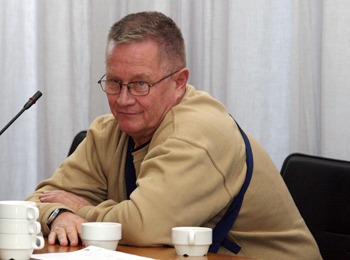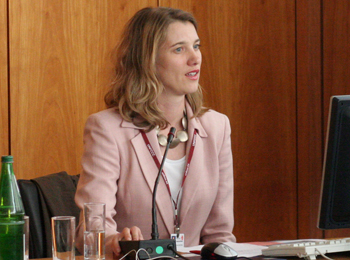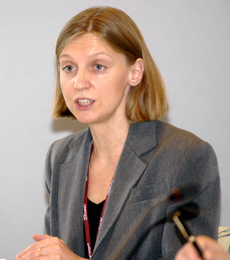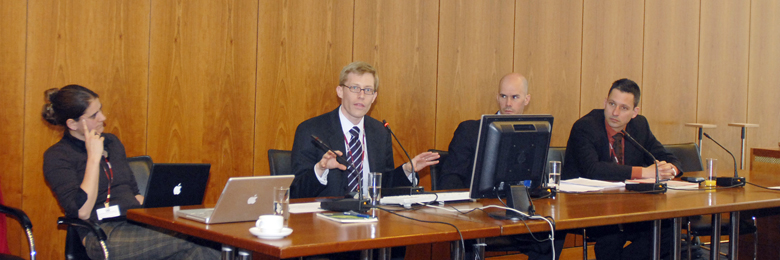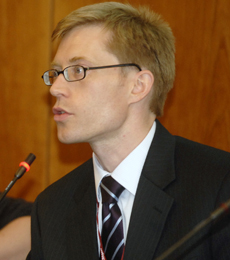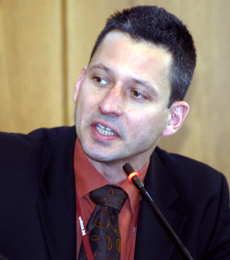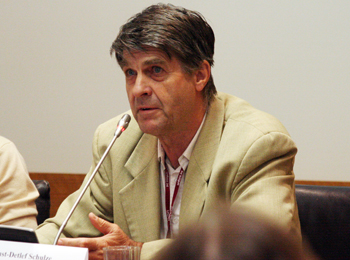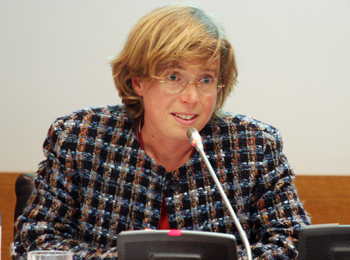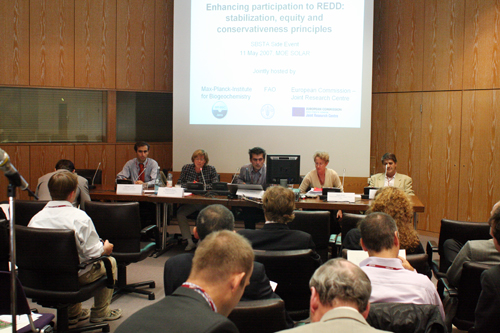 |
||
|
Published by the International Institute for Sustainable Development (IISD)
|
|||
|
A Special Report on Selected Side Events at the twenty-sixth sessions of the Subsidiary Bodies (SB 26) of the United Nations Framework Convention on Climate Change (UNFCCC)
|
|||||
| 7-18 May 2007 | Bonn, Germany | |||||
 |
|||
 |
|||
Events convened on Friday, 11 May 2007
|
Revisiting the carbon market: A panel of international scholars discusses any negative consequences of the carbon market and how they can be avoided Presented by Erasmus University |
|||
|
Miguel Lovera Rivas, Global Forest Coalition, Paraguay, emphasized that livelihoods and indigenous knowledge are often overlooked when considering carbon markets.
Jonathan Köhler, University of Cambridge, UK, stressed the false and dangerous perception that carbon markets are a panacea, and noted the ultimately political issue of determining the allocated quantity of permits. Köhler also discussed, inter alia: the skewed decisions that can result from a market for only carbon dioxide, the perverse effects that can arise from interaction with other climate policy mechanisms; and carbon markets’ inability to address vulnerability or adaptive capacity. Sandy Guantlett, Te Wananga O Aotearoa, New Zealand, presented the indigenous people’s perspective on carbon markets, noting that carbon markets are intertwined with the issues surrounding, e.g., CDM and biofuels. He discussed expected grave results as sea-levels rise and coral reefs bleach, the rate of deforestation in New Zealand, and the pressure created by plantations, highlighting that non-monetary ethical issues can be overlooked when considering cost-benefit analysis. Faizal Parish, Global Environment Centre, Malaysia, shared his experience with market-mechanisms. He highlighted the adverse consequences resulting from the increased profitability of palm oil plantations in response to governmental incentives and emphasized that these incentives, in the case of palm oil and peatlands, have significant adverse consequences, and, moreover, fail to address climate change. In the ensuing conversation, participants discussed topics including the carbon market’s relevance to Africa, potential biofuel sources, the dearth of indigenous inputs into the IPCC process, and the possible post-2012 frameworks. |
|||
|
|||
|
Practical insights on climate change adaptation and on reducing deforestation: Lessons from Annex I Expert Group on the UNFCCC (AIXG) work Presented by OECD |
|||
|
On adaptation, Adrian Butt, UK Department of Environment, Food, and Rural Affairs (DEFRA), UK, presented lessons from the UK’s work on adaptation, underscoring the cross-cutting nature of adaptation and the importance of mainstreaming adaptation efforts. He outlined the UK approach to adaptation, including its: Adaptation Policy Framework, which sets out the strategic context; Climate Impacts Programme; and research, including work on revising climate change scenarios to present probabilistic information. On the water sector, he said its cross-cutting nature presented opportunities for win-win solutions, and highlighted the need for flexibility.
Ellina Levina, Organisation for Economic Co-operation and Development (OECD), presented a paper on adaptation in coastal zones, focusing on wetlands and human settlements in the Gulf of Mexico. Noting coastal areas’ vulnerability to sea-level rise and hurricanes, and the economic impacts, Levina said current policies are inadequately enforced and overlook the issue of wetland migration. On the built environment, she said that current land-use planning policies and disaster management policies are key to resiliency. To facilitate adaptation, she said that, inter alia, information on local conditions, political will, forward-looking planning, education, and understanding of uncertainties are needed. Julia Martínez, National Institute of Ecology, Mexico, discussed payment for environmental services (PES) in Mexico, focusing on the Payments for Hydrological Environmental Services Program (PSAH) and the Program to Develop Environmental Services Markets for Carbon Capture and Biodiversity and to Establish and Improve Agroforestry Systems (CABSA). She said PSAH, which consists of direct payments to landowners, was designed to provide economic incentives to avoid deforestation where water problems are severe, and that CABSA was designed to support reforestation activities and land use changes. She also discussed the challenges, including uncertainty in the international carbon market and transaction costs. Katia Karousakis, OECD, discussed lessons learned from Costa Rica and Mexico regarding market-based mechanisms to reduce GHG emissions from deforestation. She gave an overview of the PES programs in Costa Rica and Mexico and the market-based options available, and highlighted the variance in market-based approaches’ enforcement, leakage, transaction costs and perverse incentives. She emphasized that: these market mechanisms have the potential to reduce a large fraction of GHG emissions at low costs and with co-benefits; capacity building and consistent monitoring mechanisms are essential; and further analytical research is needed on design issues. Participants discussed the possible lessons that can be learned from Hurricane Katrina, the lack of coordination between the levels of government in Mexico with regard to wetlands and land-use planning, and the pricing of PES. |
|||
|
|||
|
The CDM: Lessons learned and perspectives for the future Presented by University of Oxford Environmental Change Institute |
|||
|
Emily Boyd, University of Oxford Environmental Change Institute (ECI), underscored key questions about the clean development mechanism (CDM), such as issues related to effectiveness, equity, sustainability, and geographic distribution. She noted that the majority of CDM projects are concentrated in Asia and Latin America, with Africa and the Middle East hosting only 4% of total projects. On the issue of energy and climate mitigation flows to developing countries, she said CDM financial flows are only about 1.7% of total flows. Boyd highlighted that the Nairobi Framework aims to enhance capacity building for CDM in Africa, noted that there are 37 pipeline projects, which represents 2.7% of projects registered globally, and underscored the missing opportunity regarding cooking oven projects. She summarized a workshop on the case of the Amazon, which looked at: responses to global warming; land use changes for the “biofuel era” and the raising demand for soy; and the need for financing a climate resilient plan.
Nathan Huttman, Georgetown University, noted the need to understand different actors’ perspectives in order to improve international policy. On the business perspective, he highlighted knowledge gaps on how to encourage wide-spread CDM participation in the developing countries’ private sectors, and the need to incorporate sustainability in international policy tools. He said that the civil society argues that CDM should provide sustainability, social justice, and public participation, while donor and recipient perspectives focus on the role of, and need to mainstream, Designated National Authorities (DNAs). He highlighted that the scientific perspective raises issues regarding monitoring, baselines and additionality. Robert Tippmann, EcoSecurities, highlighted the main strategies and approaches for post-2012 climate mitigation efforts, and the possibility of linking different emissions trading systems (ETS) through mechanisms such as CDM. He summarized stakeholders’ proposals for post-2012 commitments. Tippmann noted the need for increased binding emission targets for developed countries, and questioned whether some developing countries with increasing emissions should join an extended regime. On linking the European Union ETS to other systems, he highlighted the need for binding targets and a compliance system with monitoring. In the ensuing discussion, participants debated: the role of CDM to redirect development aid to developing countries and help businesses in these countries; the role of DNAs; the need to ensure CDM projects’ sustainability; and the transaction costs associated with identifying CDM projects. |
|||
|
|||
|
Enhancing participation in REDD: Stabilization, equity and conservativeness principles Presented by the Max-Planck-Institute for Biogeochemistry |
|||
|
Annette Freibauer, Max-Planck-Institute for Biogeochemistry (MPI), said the event was jointly hosted by MPI, the UN Food and Agriculture Organization (FAO), and the European Commission Joint Research Centre (JRC). She noted the importance of Reducing Emissions from Deforestation and Degradation (REDD) in developing countries.
Ernst-Detlef Schulze, MPI, noted human activities’ impact and the influences of climate change on land uses and vice-versa. He said that attempts to mitigate climate change without recognition of land use and land-use change (LULUCF) may be unsuccessful and highlighted the need to include all carbon stock changes due to LULUCF in order to promote effective mitigation. Susan Braatz, FAO, highlighted the data needs for reducing emissions from deforestation (RED), and said that the Forest Resource Asssessment (FRA) process is based on data provided by country reports. She underscored the 2005 FRA, which indicates where data are needed for national assessments of forest carbon stocks and of changes over time. Braatz said that the potential RED uses include assisting countries to establish a reference for deforestation rate. Giacomo Grassi, JRC, noted that according to UNFCCC reporting requirements, estimates of emissions should be accurate, and uncertainties should be reduced so far as is practicable. He said that the development of “conservative” estimates is potentially feasible, since they could require considerably less data and facilitate broader participation in a REDD mechanism. Danilo Mollicone, MPI, noted decreasing forest area, and said REDD mechanisms could be combined with the stabilization of existing forest carbons stocks. He explained that, in the reference scenarios for parties’ submissions, future emissions must be compared to national reference scenarios based mainly on each party’s historical deforestation and degradation rates. He explained that after large emission reductions are achieved, positive incentives to stabilize carbon stocks should be available in order to prevent future emissions. Kevin Conrad, Papua New Guinea, said that FAO’s experience reaffirms the existence of available data, and welcomed RED incentives for countries to provide connected data to FRA. On stabilization, he highlighted that Papua New Guinea realized very quickly the need to have incentives for stabilization and not only for decreased deforestation. Jim Penman, UK, said that future commitments may be going in the direction of accounting for all carbon stock changes. He highlighted the need to identify forest management effects, which could be reflected in the compliance system. |
|||
|
|||
|
||
|
Click the above button to go back to our ENB main coverage
|
||
|
|
|
|
|
||
|
